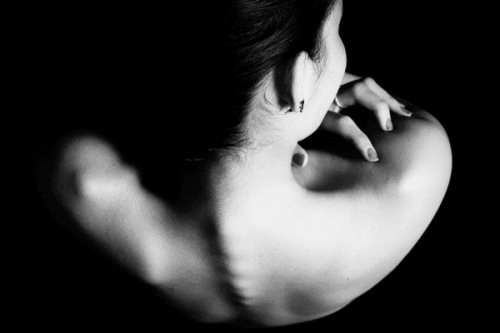Anorexia and Self-Harm: Symptoms and Treatment


Written and verified by the psychologist Gema Sánchez Cuevas
Most people have heard of anorexia, but did you know that about a quarter of patients with anorexia also deliberately self-harm?
People who are suffering from this disease tend to lose so much weight that they become weak and their bodies are seriously damaged. They often have very low self-esteem and feel like they have no control over their surroundings. As a result, they focus all their energy on the one thing they think they can control: their diet.
These days, the media plays an important role in transmitting messages about values and appropriate behavior. It overestimates the importance of physical attractiveness. This is the context that we all live in, and this culture has triggered the first cases of anorexia with self-harm.
Many people (mostly women) take great health risks just to conform to conventional beauty standards. Fashion shows and the modeling world are full of surgeries, extreme diets, etc. This public exposition is only the tip of the iceberg when it comes to what really happens under the surface.
Anorexia, Self-Harm, and Other Eating Disorders
Eating disorders are characterized by serious changes in eating patterns and behavior. There are two classic disorders: anorexia nervosa and bulimia nervosa.
Anorexia is characterized by a distorted self-image or a very restricted diet. Bulimia, on the other hand, works very differently. People with bulimia experience binging and purging periods. In both cases, however, the person’s negative self-image leads them to hate their body.

In this article, we’re going to focus on anorexia because it’s the one that is more often related to self-harm. The most common symptoms of anorexia nervosa are:
- Obsessive ideas about weighing less than the “ideal” body weight.
- Distorted view of your own body, you feel “fat” when you’re objectively thin.
- Amenorrhea (no menstruation).
- Eating progressively less, especially foods you consider “dangerous” (fats, sweets, etc.)
- A decrease in sexual activity and desire.
- Poor physical health: respiratory infections, digestion problems, headaches, and backaches.
- Feeling cold all the time, dry skin, hair loss, the appearance of fine hair all over the body, significant weight loss.
- Weakness.
From a psychological point of view, these disorders happen to people who define themselves by what they look like. People with anorexia often say things like “I’m better when I’m skinny”.
At the same time, anorexia with self-harm feeds off of negative self-worth. When you’re feeling this way, you’ll probably feel sad or melancholic. In this framework, you might find it extremely difficult (or impossible) to enjoy pleasant situations, make other people feel good, and feel accepted. You might also suffer from isolation, relationship problems, anxiety, nervousness, irritability, etc.
How to Diagnose Anorexia and Self-Harm
Anorexia with self-harm is considered a second-generation eating disorder. It consists of anorexic behavior along with bodily abuse and the use of masochistic tactics to get thinner by inflicting pain on yourself to get rid of your appetite. This triggers rapid and permanent weight loss.
People with this disorder are obsessed with being thin, but their efforts are only appreciated by other people. Anorexic patients become extremely thin, but they still feel fat when they look in the mirror or feel terrified that they’ll gain the weight back.
Thus, some anorexia patients resort to self-harm in order to lose as much weight as possible. There are three types of self-harm or self-injury:
- Mutilation or permanent disfiguration. In other words, complete amputation of a limb.
- Stereotypic mutilation: hitting yourself, biting yourself, cutting yourself deeply.
- Superficial mutilation: cuts, burns, breaking a bone, etc.
People sometimes use self-injury as a way to escape from their emotions and feelings. They think that physical pain will help them avoid the emotional pain that their illness causes. That leads them to hurt themselves.

Is There an Effective Treatment for Anorexia and Self-Harm?
Because this type of anorexia is so new, there have been very few studies about it. These days, information is disseminated at lightning speed on the Internet and social media, so new diagnoses appear almost daily.
Consequently, it’s very hard for science to respond to things at the same speed. In any case, this lack of research makes it hard to talk about a specific and effective intervention. The best option we have right now is to use methods that health care professionals already know are effective for treating body image and self-esteem issues.
Most people have heard of anorexia, but did you know that about a quarter of patients with anorexia also deliberately self-harm?
People who are suffering from this disease tend to lose so much weight that they become weak and their bodies are seriously damaged. They often have very low self-esteem and feel like they have no control over their surroundings. As a result, they focus all their energy on the one thing they think they can control: their diet.
These days, the media plays an important role in transmitting messages about values and appropriate behavior. It overestimates the importance of physical attractiveness. This is the context that we all live in, and this culture has triggered the first cases of anorexia with self-harm.
Many people (mostly women) take great health risks just to conform to conventional beauty standards. Fashion shows and the modeling world are full of surgeries, extreme diets, etc. This public exposition is only the tip of the iceberg when it comes to what really happens under the surface.
Anorexia, Self-Harm, and Other Eating Disorders
Eating disorders are characterized by serious changes in eating patterns and behavior. There are two classic disorders: anorexia nervosa and bulimia nervosa.
Anorexia is characterized by a distorted self-image or a very restricted diet. Bulimia, on the other hand, works very differently. People with bulimia experience binging and purging periods. In both cases, however, the person’s negative self-image leads them to hate their body.

In this article, we’re going to focus on anorexia because it’s the one that is more often related to self-harm. The most common symptoms of anorexia nervosa are:
- Obsessive ideas about weighing less than the “ideal” body weight.
- Distorted view of your own body, you feel “fat” when you’re objectively thin.
- Amenorrhea (no menstruation).
- Eating progressively less, especially foods you consider “dangerous” (fats, sweets, etc.)
- A decrease in sexual activity and desire.
- Poor physical health: respiratory infections, digestion problems, headaches, and backaches.
- Feeling cold all the time, dry skin, hair loss, the appearance of fine hair all over the body, significant weight loss.
- Weakness.
From a psychological point of view, these disorders happen to people who define themselves by what they look like. People with anorexia often say things like “I’m better when I’m skinny”.
At the same time, anorexia with self-harm feeds off of negative self-worth. When you’re feeling this way, you’ll probably feel sad or melancholic. In this framework, you might find it extremely difficult (or impossible) to enjoy pleasant situations, make other people feel good, and feel accepted. You might also suffer from isolation, relationship problems, anxiety, nervousness, irritability, etc.
How to Diagnose Anorexia and Self-Harm
Anorexia with self-harm is considered a second-generation eating disorder. It consists of anorexic behavior along with bodily abuse and the use of masochistic tactics to get thinner by inflicting pain on yourself to get rid of your appetite. This triggers rapid and permanent weight loss.
People with this disorder are obsessed with being thin, but their efforts are only appreciated by other people. Anorexic patients become extremely thin, but they still feel fat when they look in the mirror or feel terrified that they’ll gain the weight back.
Thus, some anorexia patients resort to self-harm in order to lose as much weight as possible. There are three types of self-harm or self-injury:
- Mutilation or permanent disfiguration. In other words, complete amputation of a limb.
- Stereotypic mutilation: hitting yourself, biting yourself, cutting yourself deeply.
- Superficial mutilation: cuts, burns, breaking a bone, etc.
People sometimes use self-injury as a way to escape from their emotions and feelings. They think that physical pain will help them avoid the emotional pain that their illness causes. That leads them to hurt themselves.

Is There an Effective Treatment for Anorexia and Self-Harm?
Because this type of anorexia is so new, there have been very few studies about it. These days, information is disseminated at lightning speed on the Internet and social media, so new diagnoses appear almost daily.
Consequently, it’s very hard for science to respond to things at the same speed. In any case, this lack of research makes it hard to talk about a specific and effective intervention. The best option we have right now is to use methods that health care professionals already know are effective for treating body image and self-esteem issues.
This text is provided for informational purposes only and does not replace consultation with a professional. If in doubt, consult your specialist.







